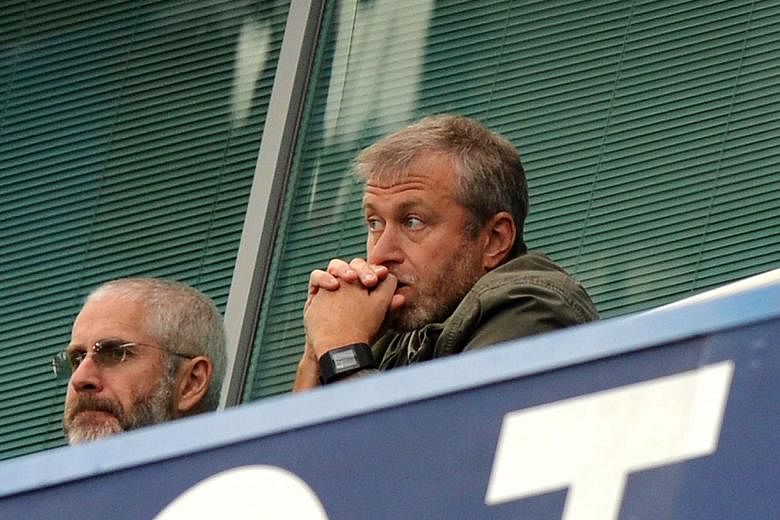LONDON • In the court of Roman Abramovich, they have learnt to look out for the telltale signs. He rarely voices his displeasure, but when that often inscrutable face morphs into what they call his "death mask", that is when the chill descends as the winds of change blow through Stamford Bridge.
Among those who mix loosely in the Russian's circles, there is surprise that Chelsea manager Jose Mourinho has, for now, been spared a second sighting of the death mask. But among the inner circle - which tends to mean those who are privileged to address him as Roman rather than as "Mr A" - it is a different story.
There they reject the portrayal of the Chelsea owner as a man prone to knee-jerk reactions or impulsiveness. "Rash?" one associate asks. "Rash is the last word I would use to describe Roman."
So how would you describe him? "Quiet," the associate says. "Private - obviously, you know that - and very loyal, unless of course you let him down, but the main things are calm, measured and business-like."
Abramovich is not afraid of a bit of spontaneity. Another associate relates tales of evenings when they would be in one of his fleet of cars, with one of his chauffeurs at the wheel, and he would settle on a destination for a night out - London, Paris, Moscow, St Tropez - and simply fire off the instruction to his staff to ready the private jet.
Now 49, though, and on his third marriage, he has become a little more sensible. If he is to invest in another yacht or a piece of art - like when he paid £43 million (S$92.5 million) in 2008 for Francis Bacon's Triptych, 1976 - he thinks about it more carefully these days.
He has certainly thought carefully about how to solve a problem such as Mourinho. On Oct 3, eight weeks after the Portuguese signed a new four-year contract, the Chelsea board met to discuss whether they might need to change manager for a 10th time in 11 years.
The support of Marina Granovskaia, Abramovich's former PA who is now a highly influential director of the club, helped the billionaire owner to go with his initial instinct, which was to give Mourinho time to sort things out.
Another four Premier League defeats later, the club's position is unchanged, but the matter will continue to be reviewed and Abramovich will continue to deliberate, asking questions, soaking up opinions, both on Mourinho and alternatives, such as Carlo Ancelotti, until the early-season crisis has either passed or escalated too far.
"Roman doesn't like sacking people, surprising as that might sound," another source says. "He's fiercely loyal to those who have worked with him for a long time, like Marina, Eugene Tenenbaum, Eugene Shvidler.
"They are like family to him. Then there is his actual family. He has been divorced twice, but his family means everything to him. If you consider his background, that is probably not surprising."
Roman Arkadyevich Abramovich was born into what one friend suggests was a "typical Brezhnev-era Soviet Jewish family - not a great deal of money" - in October 1966.
Before his first birthday, he had lost his mother, Irina, who died during a medical procedure. In May 1969, his father, Arkady, was killed in an accident on the construction site where he worked. At the age of two, an only child, Abramovich was an orphan.
Initially he was brought up by Arkady's brother, Leib, and his wife in their small apartment in the frost-bitten industrial town of Ukhta, 1,130km north-east of Moscow.
At age seven, he was sent off to Moscow - at first with his grandmother, then with another uncle, Abram - on the basis that the capital would offer him the best chance of making something of himself. At some point he returned to Ukhta to attend its industrial institute.
At 18, he was called up for national service, late enough to avoid being sent to Afghanistan, and it was in the army that he discovered the skills that would make his fortune.
In an interview with Zhizn, the Russian newspaper, in 2007, Nikolai Panteleimonov, a former army friend, claimed that Abramovich came up with a scheme whereby delivery drivers would allow fuel to be siphoned out of their vehicles, which would then be sold to other delivery drivers - all of them aware of the scheme - at a reduced price.
"Every party involved was happy," Panteleimonov said. "He could make money out of thin air."
This year's Sunday Times Rich List estimated Abramovich's personal wealth at £7.29 billion. That put him at No. 10 in the list of Britain's richest people.
Security is a big deal for the father of five. The cost of his personal security operation in Britain alone, with a staff of 20, is reported to be more than £1.2 million.
So what is his grand plan as he moves towards 50?
"He's an investor," the associate says.
"There are investments in steel, gold, nickel, forest products, real estate in Moscow, start-ups in Russia and Israel, green energy."
Where do Chelsea fit into that? "It has never been a business investment in the same way the others are. He gets a great deal of excitement from it - and no doubt frustration too, at times - but, more and more these days, it's a mature business."
THE TIMES, LONDON

